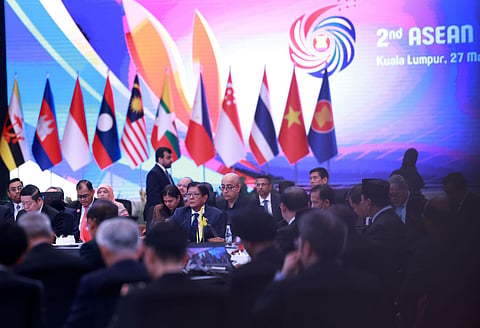
- NEWS
- the EDIT
- COMMENTARY
- BUSINESS
- LIFE
- SHOW
- ACTION
- GLOBAL GOALS
- SNAPS
- DYARYO TIRADA
- MORE

President Ferdinand Marcos Jr. has sought the help of Arab nations sitting as the Gulf Cooperation Council (GCC) in building up the financial capability of the Loss and Damage Fund, which the Philippines hosts.
On Tuesday, Marcos emphasized the challenges brought by climate change, stressing it as “the most defining challenge” of our time.
He explained that both the ASEAN region and the Gulf region are climate-vulnerable, exposing citizens to climate-related risks.
“Both our regions are climate-vulnerable, and our populations face significant climate-related risks such as sea level rise, rising temperatures, desertification, and loss of biodiversity, among others,” he said during his intervention.
Marcos noted that as the Philippines serves as host of the Fund for responding to Loss and Damage, the country will be able to accelerate unhindered access of developing nations to climate finance, which shall aid in the development and implementation of transformative and science-based strategies and initiatives for climate change, adaptation, mitigation, and disaster risk management.
“As host of the Fund for responding to Loss and Damage (FRLD), the Philippines would like to encourage contributions to that Fund,” Marcos told the GCC members.
Earlier, Marcos said the Philippines will advocate for scientific and evidence-based, investment-led, and transformative solutions to the climate crisis.
As both regions are surrounded by water, President Ferdinand Marcos Jr. stressed the necessity of freedom of navigation in international waters with the Gulf Cooperation Council (GCC).
Marcos likened the Arabian Sea with the South China Sea, which are both utilized by world nations as passageways for trade, boosting global economies.
“The South China Sea and the Arabian Sea cover vital sea lanes that serve as lifelines to regional and international commerce both in our regions,” he said.
Apart from the freedom of navigation, Marcos also sought unimpeded commerce and marine environment protection in these waters through compliance with established international law and the United Nations Convention on the Law of the Sea.
In addition to advocating for freedom of navigation, Marcos also emphasized the importance of unimpeded commerce and the protection of the marine environment in these waters by upholding established international law and the United Nations Convention on the Law of the Sea.
Locally, Marcos pushes for swift passage of the Code of Conduct (CoC) in the South China Sea, stressing the need to safeguard maritime rights, promote stability, and prevent miscalculations at sea.
